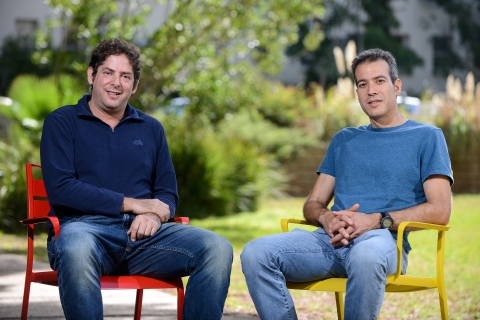The algorithm diet
Same food, different blood sugar responses
Briefs

A new study by Weizmann Institute scientists has found that individual blood sugar levels in response to eating the exact same food vary dramatically—which might explain why one person can’t shed the extra pounds while a friend who consumes the same foods stays slim and trim.
The scientists also developed an algorithm that accurately predicts post-meal blood sugar levels based on a person’s individual biological makeup and lifestyle—throwing into question standard dietary recommendations.
The finding, published in the Nov. 19 issue of Cell, upends entrenched notions of healthy food and indicates that tailoring eating habits to a person’s biology may be the best way to keep the weight off and stay healthy.
Authors Prof. Eran Segal (pictured at right) and Dr. Eran Elinav continuously monitored blood sugar levels of 800 people and nearly 47,000 meals, each over the course of a week, focusing on how certain foods trigger responses in blood sugar, a measure called postprandial glycemic response, or PPGR. Blood sugar levels are strongly associated with the metabolic syndrome which includes weight gain, obesity, diabetes, hypertension and more.
Until now, physicians and nutritionists have relied on something called the glycemic index, or GI, to determine what foods are good for everyone. However, the GI is a fixed number for each food item.
What the Weizmann Institute team found was that this number is a poor predictor of the actual response of many people.
Using information collected through health questionnaires, body measurements, blood tests, glucose levels, stool samples, and a mobile app used to report physical activity and food intake, the scientists went on to devise an algorithm in order to predict personalized blood sugar responses. The algorithm - which they validated in an additional 100 individuals - is able to predict the blood sugar levels following consumption of different foods.
“The huge differences that we found in the rise of blood sugar levels among different people who consumed identical meals partly explain why so many diets fail in so many people. Our results point to personalized eating choices being more likely to help people stay healthy than universal dietary advice,” says Prof. Segal, who has a joint appointment in the Department of Computer Science and the Department of Molecular Cell Biology. Dr. Elinav is a member of the Department of Immunology.
Some of the findings surprised the scientists themselves. One woman enrolled in the study who had obesity and pre-diabetes—and had previously tried and failed a range of diets over her life - learned that her blood sugar spiked markedly after eating tomatoes. For other people, bananas caused bigger surges in blood sugar levels than cookies. The examples are numerous, the scientists say, and in fact, every person enrolled in the study experienced several surprises and discoveries about which foods are best for him or her.
The study was part of a longer-term initiative by the Segal-Elinav team called the Personalized Nutrition Project (www.personalnutrition.org), which integrates tools from biology and computer science and is unique in its focus on the microbiome, gut bacteria that are increasingly understood as playing a key role in health and disease—thanks in part to studies like these.
“Findings from our study may bear critical importance to trillions of people worldwide who suffer or are at risk for developing obesity, diabetes, and their complications,” says Dr. Elinav. “Science-driven, personalized diets may enable the integration of nutrition into both healthcare and daily living.”
David Zeevi and Tal Korem, PhD students in Prof. Segal’s lab, led the study, in collaboration with Dr. Niv Zmora, a physician conducting PhD studies in Dr. Elinav’s lab, and PhD student Daphna Rothschild and research associate Dr. Adina Weinberger from Prof. Segal’s lab.
You can also see a video animation describing the study:
https://www.youtube.com/watch?v=Ryc5M3Ciytg
Prof. Eran Segal’s research is supported by the Crown Human Genome Center, which he heads; the Adelis Foundation; the European Research Council; Mr. and Mrs. Donald L. Schwarz, Sherman Oaks, CA; Leesa Steinberg, Canada; and Jack N. Halpern, New York, NY.
http://www.wisdom.weizmann.ac.il/~eran
Dr. Eran Elinav’s research is supported by the Abisch Frenkel Foundation for the Promotion of Life Sciences; the Gurwin Family Fund for Scientific Research; the Leona M. and Harry B. Helmsley Charitable Trust; the Crown Endowment Fund for Immunological Research; the Adelis Foundation; the Rising Tide Foundation; the Vera Rosenberg Schwartz Research Fellow Chair; Yael and Rami Ungar, Israel; John L. and Vera Schwartz, Pacific Palisades, CA; Gail and Alan Marcovitz, Canada; Leesa Steinberg, Canada; Andrew and Cynthia Adelson, Canada; the estate of Jack Gitlitz; the estate of Lydia Hershkovich; Mr. and Mrs. Donald L. Schwarz, Sherman Oaks, CA; Jack N. Halpern, New York, NY; and Aaron Edelheit, Boca Raton, FL. Dr. Elinav is the incumbent of the Rina Gudinski Career Development Chair.

Eran Elinav (Left) and Eran Segal (Right)